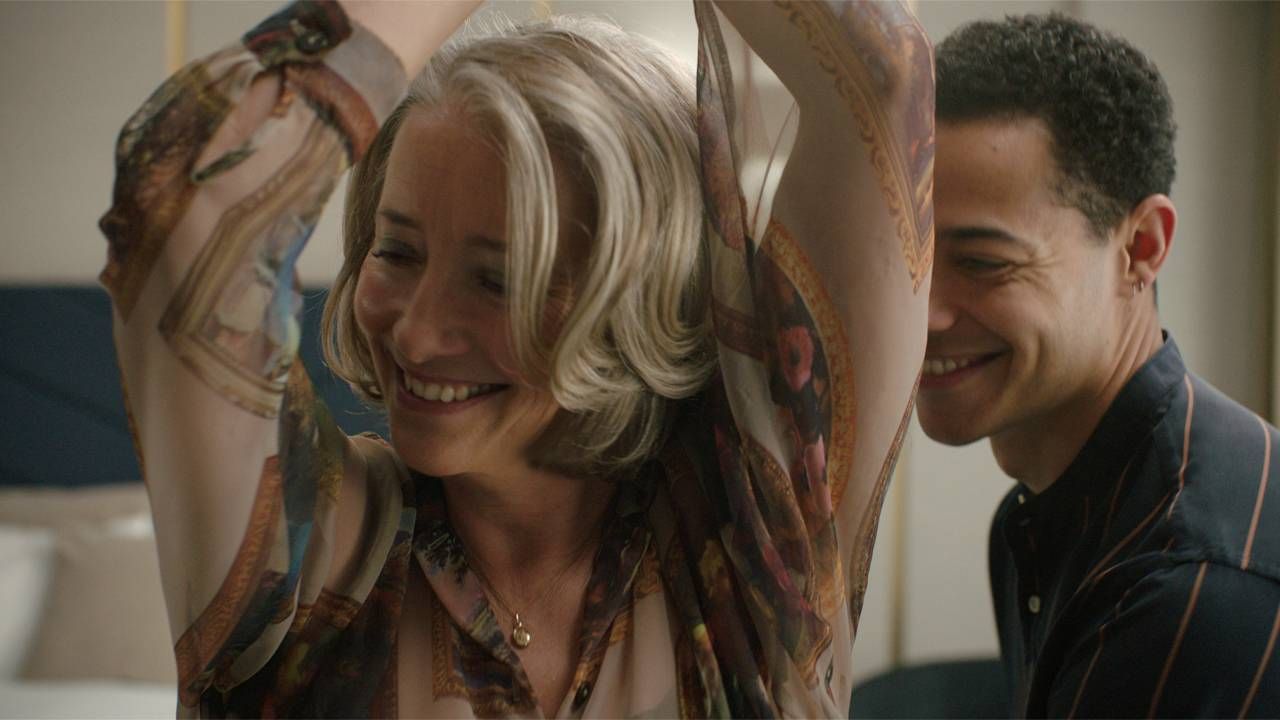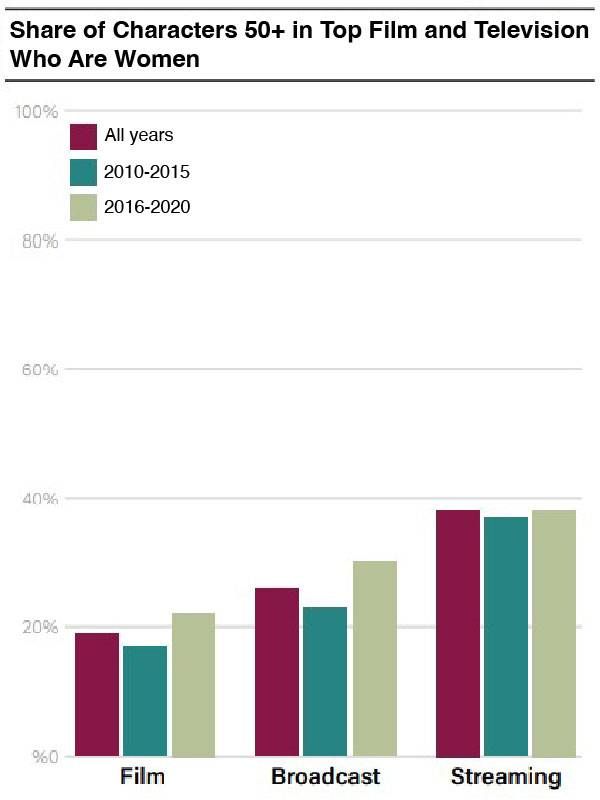Ageism in Hollywood: ‘The Worst I’ve Ever Seen It’
An industry insider on ageism in TV and films, plus a look at his advocacy group’s fiery ‘United States of Ageism’ social media campaign
In Next Avenue's July 2021 article on Age Inclusion in Media (AIM), a nine-year-old nonprofit created to help end ageism in the TV and film industries, the group's Executive Director David Gittins said its goal was "to make ourselves obsolete." One year later, Gittins now sadly says he thinks ageism in Hollywood is "the worst I've ever seen it."

Recent research from other analysts confirms that despite some hit TV shows and films starring actors in their 60s, 70s and 80s (including Netflix's "Grace and Frankie" created by Next Avenue Influencer in Aging Marta Kauffman and HBO Max's "Hacks"), ageism and ageist tropes remain rampant on the big and small screens.
A study of older actors by the retirement residence company Amica Senior Lifestyles found that "only 2% of top 2021 movies featured senior lead actors." (Amica defines "senior" as 60+.)
A Dearth of Characters 50+
Similarly, a 2021 report from the Geena Davis Institute on Gender in Media concluded that characters 50+ were "less than a quarter of all characters in top-grossing domestic films and most-popular television shows from 2010 to 2020." And they skewed male: men represented four out of five 50+ characters in film, three out of four in broadcast television and two of three in streaming TV.
"Our analysis of the most popular films and television shows from 2010 to 2020 suggests that on-screen ageism persists and is particularly evident among on-screen women aged 50+," the report noted.
When women 50+ were on screen, it added, they were "commonly cast in supporting and minor roles" and "less likely to be developed as characters in interesting ways."
'Entrenched' Ageism Against Women on Screen
In May 2022, more than 100 British actors and public figures — including David Tennant and Lesley Manville — signed an open letter calling for an end to the entertainment industry's "entrenched" ageism against women over 45. The letter, written and circulated by the activist group Acting Your Age Campaign, said women in the U.K. have a "shelf life" on screen, but men have "a whole life."

Entertainment writer Stephen Whitty put it this way in a recent article on the NJarts.net site: "Hollywood's message is clear. Women get old. Men just get… older." Whitty called for "movies in which a woman's age isn't a definition, but a description — and just one of many."
What's required, he wrote are "more stories in which we see women in their 50s, 60s and beyond learning new things, meeting new challenges, overcoming new obstacles — and yes, occasionally like [Emma] Thompson in [the new film] 'Good Luck to You, Leo Grande,' making out like bunnies."
Directors and Writers Also Feel the Sting
Ageism in Hollywood often sits in the director chair, too.
Last year, when Yeshiva University business school professors Shu Han and S. Abraham Ravid documented the films made through 2018 by all U.S. directors who started their careers between 1995 and 2015, they concluded "the probability of hiring drops by about a half, everything else equal, as a director ages from 40 to 55."
Age discrimination for directors, Han and Ravid added, "starts immediately as a director enters the profession" and that directors [generally] "do not just retire but seem to be unable to find another directing job."
And a 2020 Writers Guild of America report found that just 1% of TV writers at the supervising producer level or below were over 55. "It's unicorn territory there," says Gittins.
AIM had hoped to improve prospects for older screenwriters last year when it launched the Silver Bullet Screenplay Contest for people over 40.
It awarded the grand prize to Dana Coen, 74, for his "Sleeping Upright" script about a 41-year-old awakening from a coma to find he has become famous. The former TV writer was then administrator of the University of North Carolina at Chapel Hill's undergraduate dramatic writing program.
But Gittins, a British playwright and TV writer, said that "what we found with Dana's script after the contest, actually, was there's many more people who are just not interested in dealing with older voices and older stories."
Winning a Screenplay Contest, But...
Although winning the contest meant Coen got a meeting with a writer/producer/story editor at a top talent agency and representatives from roughly 40 companies read his script, it didn't receive any nibbles.
"What I was looking for was renewed interest in my screenplay and my talent and full representation from a manager or an agent," says Coen. "That's not what I got."
"It is a violation of my civil rights and a manifestation of ageism."
However, he adds, "what I got was encouragement, which is something all writers crave. So, for someone my age, I think that was significant."
Coen laments that the film and TV industry "chases trends and they have been skewing pretty young for a long period of time." But his "Sleeping Upright" script, he says, "is driven by ideas that tend to reference the adult experience."
Newly retired, Coen now hopes to get plays he has written produced by small theater companies and snag Hollywood interest for three screenplays with adult themes.
AIM aims to unveil a new screenwriting contest for older applicants this year, expanding it to television scripts — if it can find sponsors to pay for a of mentoring for winners.
The United States of Ageism
Lately, the group has been busy with a new social media initiative called "The United States of Ageism," produced with The American Society on Aging. It collects examples of age discrimination and ageist actions from each state and posts them on Facebook, Instagram and Twitter (#USofAge). Following are some examples:
- A federal jury awarded fired 65-year-old Alabama CVS pharmacy supervisor Cody Berguson more than $2.1 million because the company "willfully" violated the Age Discrimination in Employment Act.
- In Pennsylvania, three former Community College of Philadelphia faculty members sued the school and its president for age discrimination because they said they were forced to either retire or double their workload.
- A Rhode Island couple, Len Lavoie and Peter Giroux, 74 and 69, were denied the opportunity to foster a dog because they were deemed too old. They'd had 30 years of experience as dog owners.
- Virginia school board candidate Audrey Clement filed a Washington Post questionnaire saying she was 52, but the Post determined she was actually 72. "I believe that The Washington Post doesn't have any right to require that information of me or any other political candidate," Clement said when asked about the discrepancy. "I believe that it is a violation of my civil rights and a manifestation of ageism."
Seeking Signs of Inclusivity
Contrasting these types of posts, AIM has also heralded a few efforts of age inclusivity around the country. "It's much easier to find the ageism," Gittins says.
"We can't let it be acceptable anymore."
One of the age inclusivity posts observed that the Community of Vermont Elders' compiled examples of ageist speech and behavior that the group said "are so common we might not even notice them." (They included telling someone they're too old to take part in a certain activity or expressing surprise they "still" skydive, run marathons, drive, etc.")
Gittins and AIM plan to continue the drumbeat to draw attention to ageism in America, including in Hollywood.
At the American Society on Aging's annual conference in April 2022, Gittins emphatically told the audience: "We need public outrage to get traction about ageism — like with #MeToo. We can't let it be acceptable anymore."


